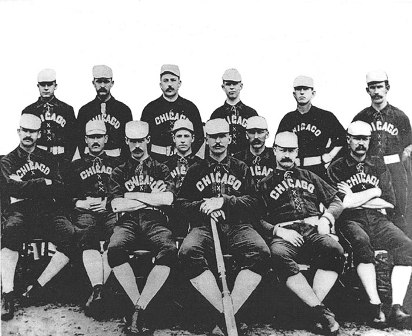Clark Griffith repeated the story about how in 1892 he ended up in Missoula, Montana many times. After the American Association disbanded, Griffith went west to join the Tacoma franchise in the Northern Pacific League. The team struggled financially, and after receiving an offer from a mining company, the entire team relocated to Missoula and joined the Montana State League.

Clark Griffith
Griffith appears to have only once told a story about gambling, guns, and baseball in the mining towns of Montana that season.
Shortly after he bought 10 percent of the Washington Senators—he raised the money by mortgaging his Montana ranch—he told William Peet of The Washington Herald about his time in Missoula. Peet said:
“When there is no real news to hand out, Griff sits back in his chair and between puffs of a cigar tells a lot of interesting baseball stories.”
Griffith told Peet:
“The day before we arrived in Missoula the management there released every man on its payroll, and the day we opened up the ballpark was packed. Missoula had been the joke of the league.”
Griffith said the club started winning immediately and that the only two pitchers Missoula carried where him and George “Lem” Cross:
“’George Cross and myself did all the twirling, and we worked every other day…our first out-of-town series was in Butte, Montana. When we hit that town they were waiting for us with open arms.’
“’Our manager Billy Works [sic Work] was told to get all the money he could scrape together, as the Butte gamblers would bet their last cent of the home club. Works dug up $5000, and the night before the opening game waited for somebody to cover his coin.’
Griffith said the gamblers laid off the first game and did not cover Work’s bet; Cross was “batted all over the lot” and Missoula lost 15 to 4:
“’That night the Butte gamblers bet their heads off, covering our manager’s $5000 in jig time. I was slated to pitch the next day and the game was a tight one from the start.’
“’Butte tied the score in the ninth, when a ball got away from my catcher. The ball rolled to the stand, and as he was chasing after it one bug poked his arm over the grandstand rail, extending in his hand a six-shooter: ‘Let that ball alone,’ he cried. The catcher stopped in his tracks, and the runner scored from third.’”
Missoula won the game in the tenth, and according to Griffith, Work immediately bet his winnings on the next day’s game:
“’Cross confided to me that he wasn’t going to take any chances with such a bunch of roughnecks. ‘I don’t like the looks of those guns,’ he said. I believe that if I had not stuck close to him all night he would have jumped town.’
“’We had nobody else to put in, and Cross simply had to pitch the game. We had an awful time getting him into a uniform, but with a lot of jollying we finally induced him to come along. He was scared stiff when he entered the box.’
Griffith said Cross “got his nerve back” and beat the Butte team 6 to 1; the easy win seemed to nullify the effects of the armed Butte fans. Griffith said:
“’It was a grand clean-up all right, and our manager gave me $200 for winning my game.”
Note: This was not Griffith’s only experience with mining, and with guns at the ballpark—he threatened to skip out on his contract before the 1900 to become a gold miner, and during that same spring he was on the mound when “a Southern gentleman opened up with a .44.”


Leave a comment